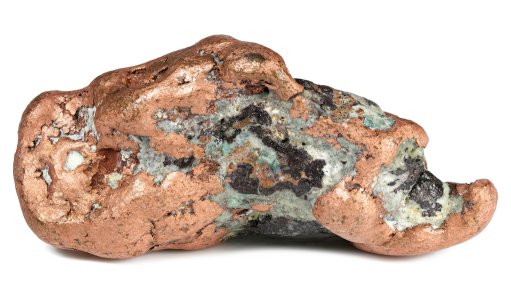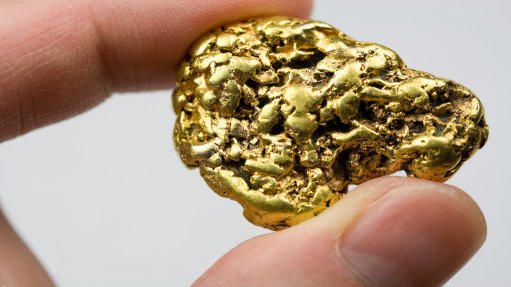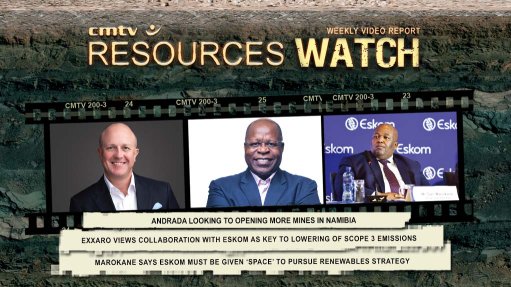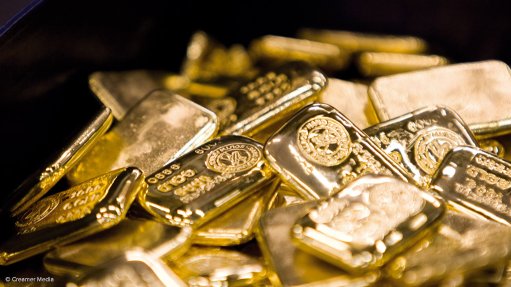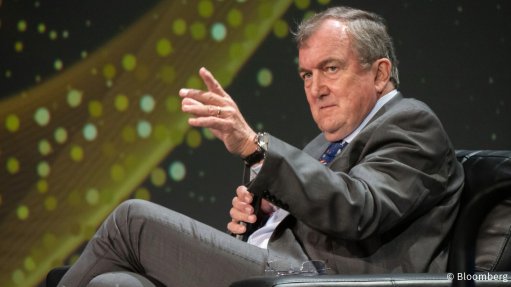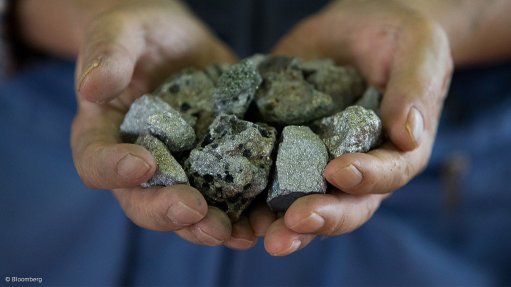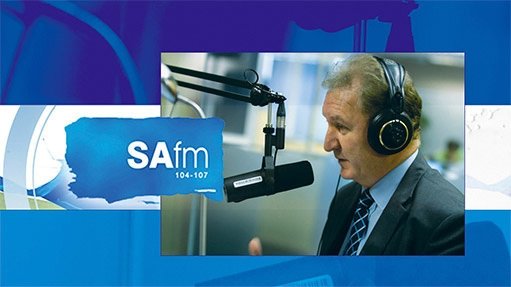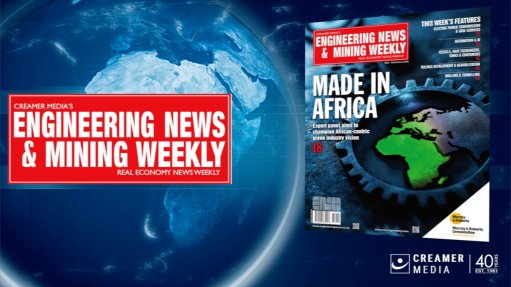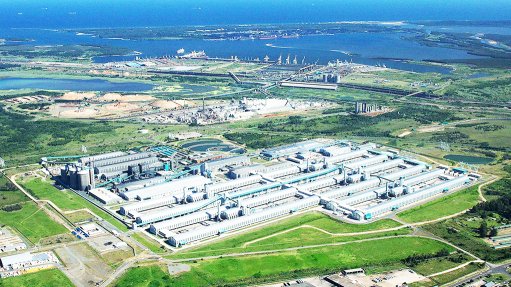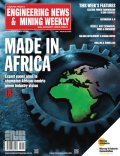On-The-Air (02/10/2015)
Every Friday morning, SAfm’s AMLive’s radio anchor Sakina Kamwendo speaks to Martin Creamer, publishing editor of Engineering News and Mining Weekly. Reported here is this Friday’s At the Coalface transcript:
Kamwendo: The VW emissions scandal is opening the way for fuel cell cars that use our platinum.
Creamer: The fuel cell cars, we should really be pushing these hard now. With this VW emissions scandal it really opens the way up, because there they were cheating with the amount of pollution that were going into the air and they were able to do it with a few software tricks. But, with a fuel cell, no nasties at all go into the air. Isn’t that the answer that we want? Why the world is waiting, I don’t know. This is proven technology, clean technology, reliable technology and scalable technology. The window is wide open for South Africa, because every fuel cell in your car will use up to 14 grams of platinum. That is just what we need. We see the platinum price just tanking and we need some demand push. With the VW emissions scandal, of course, it is hurting platinum for the moment. People are saying let’s get rid of diesel. Switzerland saying don’t allow the VW diesel in here, because the cheating aspect has meant that people are now studying this and they are finding that these catalytic converters in the diesel cars are not really effective. There is still carbon dioxide and nitrogen going into the air. Fuel cell cars can beat off the battery cars. We see now if you go to Melrose Arch in Johannesburg they have got a power point there, that if you’ve got the electric BMW you can go and plug in. It takes like two and half hours to recharge your cars. That is another deception, because you are still putting nasties into the air. In South Africa, we are using constrained electricity, but in the power stations where it is being produced the nasties are still going into the air. So, what about going to the fuel cell? It can’t fool anybody because there are no nasties.
Kamwendo: Top quality South African coal – once the darling of global markets – is now being left for dead as South African coal exportation gets turned on its head.
Creamer: This was a shock this week. The Fossil Fuel Foundation, spoken to by Mr Coal Xavier Prevost, was told that the world was no longer interested in our top quality coal. We are talking about the high calorific value RB1 etc. This is left for dead. What the world wants is the cheaper coal. It is just like Eskom has been used to using the lower grade coal, the world also wants it. South Africa, through Richards Bay Coal Terminal, and it is a very important terminal that earns us a lot of foreign exchange, is not going into Europe, the former main destination, in the same way as it was it the past. It is going to India with lower grade coal. It is going into the Middle East, which is content with lower grade coal. It is going into Africa, 13%. Here we are sitting with this high grade coal. Do we want to give it away with the prices dropping to $50 a ton and below? Surely we should turn it inward and that was the message from Prevost, who has been studying this for decades now. He is saying turn inward, don’t let that coal go out now, make sure that you have got a better set up, logistics have inland terminals to deal with this coal. Instead of the local coal we use here, I am not talking about Eskom and Sasol, because they use enormous volumes of coal, but coal consumed in South Africa, the local volume is about 26-million tons. Try and turn that into 80-million tons. How do you do that? Prevost is saying let people help Eskom. The industrial companies that can put in boilers and generate their own steam and electricity, let them use this high calorific value coal and let it come internally. He has obviously come under pressure, because he is the man that used to say let’s export everything we can and earn this foreign exchange. He is saying that he is not doing it for ideological reasons, it is for economic reasons now. Let’s turn inward with the coal.
Kamwendo: Bad legislation is being blamed for the wipe-out of our once-buoyant diamond beneficiation industry.
Creamer: I think the shadow Minister of Mineral Resources James Lorimer couldn’t hold himself back. This was the last straw when Zlotowski Diamond Cutting Works said they are closing down, which will be a big blow to the Newcastle area, where they are mainly involved. I think that made Lorimer get to his pen and he put out his media release saying that we just watched the cutting and polishing of diamonds industry die. Now, we have seen a 95% wipe out. Why has this happened? He is saying that it is bad legislation. The government was warned by the industry in 2007 to not change the Diamond Second Amendment Act in the way they wanted to do it, because it was going to destroy the industry and now that is just what has happened. We don’t have that cutting and polishing anymore, which used to employ about 4 500 people and it is now down to 200 people. All of this self inflicted because government created a micro management style. Those director generals and civil servants who were involved with changing the diamond legislation and the State Diamond Trader, are no longer in diamonds, they are out of the industry. So, this is what often happens. The politicians who lay down the law aren’t there for long and then everyone else suffers. Lorimer is saying that here we go with a wipe out and we need to overall the legislation again and follow the example of countries that cooperate in this diamond business, like India and Belgium, but don’t come with destroying an industry through bad legislation. What’s more he says it was badly implemented. So you have a double whammy and we see that the State Diamond Trader situation is in limbo. We are actually inflicting punishment upon ourselves.
Kamwendo: Thanks very much. Martin Creamer is publishing editor of Engineering News and Mining Weekly, he’ll be back with us at the same time next week.
Comments
Press Office
Announcements
What's On
Subscribe to improve your user experience...
Option 1 (equivalent of R125 a month):
Receive a weekly copy of Creamer Media's Engineering News & Mining Weekly magazine
(print copy for those in South Africa and e-magazine for those outside of South Africa)
Receive daily email newsletters
Access to full search results
Access archive of magazine back copies
Access to Projects in Progress
Access to ONE Research Report of your choice in PDF format
Option 2 (equivalent of R375 a month):
All benefits from Option 1
PLUS
Access to Creamer Media's Research Channel Africa for ALL Research Reports, in PDF format, on various industrial and mining sectors
including Electricity; Water; Energy Transition; Hydrogen; Roads, Rail and Ports; Coal; Gold; Platinum; Battery Metals; etc.
Already a subscriber?
Forgotten your password?
Receive weekly copy of Creamer Media's Engineering News & Mining Weekly magazine (print copy for those in South Africa and e-magazine for those outside of South Africa)
➕
Recieve daily email newsletters
➕
Access to full search results
➕
Access archive of magazine back copies
➕
Access to Projects in Progress
➕
Access to ONE Research Report of your choice in PDF format
RESEARCH CHANNEL AFRICA
R4500 (equivalent of R375 a month)
SUBSCRIBEAll benefits from Option 1
➕
Access to Creamer Media's Research Channel Africa for ALL Research Reports on various industrial and mining sectors, in PDF format, including on:
Electricity
➕
Water
➕
Energy Transition
➕
Hydrogen
➕
Roads, Rail and Ports
➕
Coal
➕
Gold
➕
Platinum
➕
Battery Metals
➕
etc.
Receive all benefits from Option 1 or Option 2 delivered to numerous people at your company
➕
Multiple User names and Passwords for simultaneous log-ins
➕
Intranet integration access to all in your organisation







